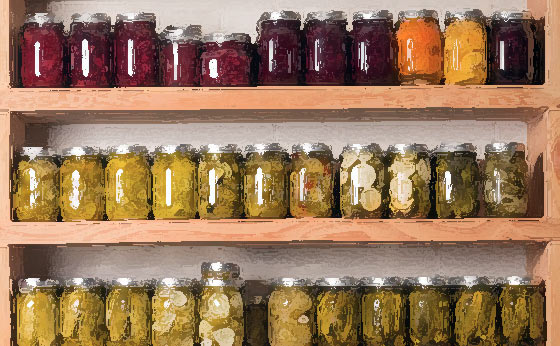How To Get Your Wife and Kids to Prep

Guest Post: by Clinton Crafts
The greatest challenge I’ve faced as a prepper has been how to include my wife and four children in my preparation efforts.
My wife and 9-year-old daughter are not particularly interested and my 3-year-old–well, he’s 3. On the other hand, my 11 and 10-year old boys are a bit more interested, but have other interests, too.
I am re-posting this guest-article because it is very likely a common (and important) issue among many preppers, and worth discussion. -Ken J.
When I talk about preparation efforts, I don’t mean showing up in the middle of the night with a metal garbage can screaming, “What do you do?”, to improve your family’s reaction time. That would not only be traumatizing, but would discourage your wife from any further “prep’ talk”. Understand it’s not about you and your effort to prepare your family. It’s a team effort and without everyone’s buy-in, it will end in frustration.
First, explain to your wife why you’re interested in the subject of prep’ing and keep it as general as possible (i.e., natural disasters, economic uncertainties, and man-made accidents). Reassure her that the investment can always be there to help the family in case of a job loss. In tight financial times, the issue of money can be a powerful obstacle; so, have an idea of how much it will cost the family per month before going to your wife to discuss partnering with her in this endeavor. For example, I approached my wife and stated I would like to be able to pick up some food items every payday in the amount of $20. This has been used to pick up 10 boxes of pasta and 10 cans of tomato sauce; also, 16 one-pound bags of beans; or, 40 50-cent cans of vegetables. You would be surprised what you can build up in your food stash in a few months.
I know there’s a lot more to prep’ing, but a family of six requires quite a bit of food over a long period of time. It is a good place to start. (The building of a small, monthly prep’ savings for “go bags” and water purification is a later step.) The point is, you want your wife onboard as a partner in the effort–not as a recruit. Stress that you need her and ASK her if she would come alongside in this endeavor. Remember: “Tellin’ ain’t sellin’.”
Next, explain to the kids why you and Mom are working together to prepare the family. Avoid the scary details and focus on even more general reasons, such as “just in case we have to leave the house for a few days”. Include the children by assigning them a task based on what they might seem good at. For example, I have given one of my kids the task of “medic to take care of anyone who needs help” (i.e., first aid); the other kid, the task of “navigator to help us get to where we need to go” (i.e., reading a compass and map); the next kid, the task of “logistician and cook who helps keep an inventory of all the things we need in our ‘go bags’ as well as ensures we have the food we’ll need”; last, the 3-year-old gets to walk around with his tiny “go bag” and dig out all of the contents while we work together.
For the kids who have a task, work with them and encourage them to share their newfound skills with each other. After they become comfortable with their assignments, change who has what tasks. This doubles their skillsets and keeps it from becoming monotonous. You will be surprised at how enthusiastic kids are to learn new things they can actually apply to everyday life.
Lately, I have even included the kids in a simple series of exercises at least four nights a week. I explained that it is to ensure if we have to carry our “go bags”, we are strong enough to do so. This also helps to give them a sense of inclusion and empowerment, while building their strength. Surprisingly, the kids are more than eager to participate. Don’t treat the exercises like a boot camp, because you will turn them off to the idea of anymore prep’ talk. Remember: If the wife and kids cannot “go” when it’s time, guess who’s going to have to carry them in addition to the “go bag” when it comes time?
Prep’ing can be a challenging subject to put towards your family. Nevertheless, if you approach your wife and kids with an excitement to learn practical life-skills and to build up a cost-effective, survival stash, you will reap the rewards of seeing a talented and motivated team that not only works well together when it is needed, but in everyday life as well.
[Ken adds] Fortunately for me, Mrs.J has always been on-board with preparedness, but what are some of your suggestions or experiences with a spouse who has not been on-board with the notion of prepping? How have you handled it?
